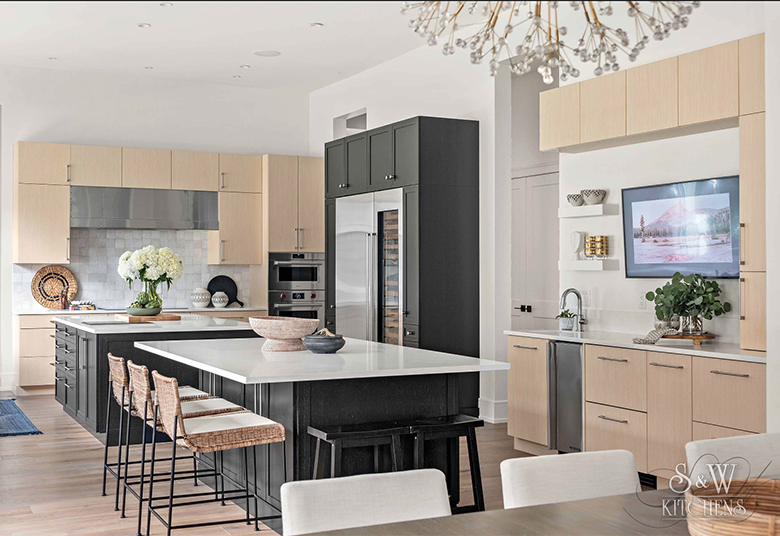1. Qualify Your Remodeling Contractors
Do your research. Taking the time to review potential remodeling contractors can give you additional insights needed to help you make your decision. Specifically, you’ll want to look at licensing credentials, services offered, background checks, job supervision, brands used, references and customer reviews. .
Make no mistake about it, remodeling is a serious undertaking, and you’ll want to make sure you have experienced professionals handling your project. You don’t want to make costly mistakes that you’ll end up regretting for years and years down the road.
To learn more about S&W Kitchens , visit our FAQ Page.
2. Talk to a Few Different Companies
We recommend talking to at least 3 companies. This allows you to better understand pricing and the scope of work needed. The pricing will be different for each and there will likely be differentiation in services offered by each contractor.
Another benefit of getting multiple bids is it allows you to get to know the personalities and communication styles of each firm. You’ll be working closely with this team in your home for an extended period, so it is very important that you have a good rapport. A great relationship with your remodeling team goes a long way in achieving a successful renovation!
Want to get started on your project bid? Schedule a complimentary consultation!
3. The Lowest Price Isn't Always the Best Price
Yes, you read that correctly! Simply looking at overall cost is not the best way to compare bids. You’ll want to break the bids down into categories or line items.
Start by looking at large line items like demolition, plumbing, electrical, flooring, cabinets, and countertops. Residential remodeling jobs should include all these basic line items in detail and it’s a good place to start your analysis.
Make notes of any differences in the scope of work - for example one company might include the cost of demolition and the other does not. Or perhaps the layout in one bid is different than on another bid - that could mean a huge difference in cost.
Remember, if a price is too good to be true, it probably is. You’ll also want to make note of items that are significantly lower in cost than on the other bids. Compare the scope of work on that item in relation to the other bidders.
Go through your list with each of your contractors to hear what they have to say about the discrepancies. if you want to know what exactly is included in a line item or summary number, don't hesitate to ask for clarification, a good contractor will be happy to dig in and explain.
Bids that are ambiguous might be lower in cost, but rest assured those costs will get included in the long run resulting in a higher final price than what was initially quoted.
4. The Devil is in the Details
One thing you do not want in a remodeling bid is ambiguity. Your bid should include details – the more detail, the more accurate it will be. If you are seeing vagueness and a lack of specifics, then you are not getting an accurate estimate.
Look for comprehensive bids with line items detailing exactly what the company will be doing and what materials are being used.
5. Pay Attention to Material Allowances
In a bid estimate, an “allowance” is considered a ballpark estimate in which the exact details and costs have not been determined. This is frequently seen with materials.
There are certain situations in which allowances are needed – for example, you want new flooring for your kitchen, but you haven’t yet selected the materials. Or maybe you haven't yet decided if you want to splurge on high-end appliances or the expensive tile. In these scenarios, we might set an allowance for the materials and firm it up once the customer has made their final selections.
Allowances are a standard practice and you should expect to see them in your bid. However, you should be aware that some contractors intentionally create unrealistic, low allowances to reduce the cost of the overall bid to help them get the contract, thus increasing the total project cost in the long run.
Always trust your instincts and remember you can ask your contractor to firm up some of the allowances. In the example above, we described an example of an allowance for flooring. To get a firm bid for that item, simply work with your contractor to select the flooring materials to get the actual cost into your bid.
It’s a bad sign if your contractor doesn’t want to work with you to firm up allowances. A professional contractor will be able to work with you to get the most accurate pricing in your bid if you are able to provide all the necessary information.
6. Ask Lots of Questions
If you’re unsure about something, ask questions. Our team always appreciates the opportunity to explain bids to our customers. It’s not insulting to question pricing and ask for changes– our goal is to make sure you are comfortable with the scope, the design, and the final project price. We are always willing to meet homeowners at all levels regardless of budget.
We want you to have a clear understanding of the bid. Empowering our customers with knowledge helps to make the actual construction proceed smoothly with little or no uncertainty about what is included.
Remember – price isn’t everything. One contractor may be notably higher in price but give them the opportunity to explain why. As you can see by all the info we’ve shared here, they may have a very good reason for it.
7. We Are Here to Help
Here at S&W Kitchens, we want our customers to make the best decisions for their home regardless of who they choose to handle their remodeling project. Feel free to ask your designer for help comparing the bids you’ve received. We’ll explain the various elements and details so that you can feel confident in choosing the right partner. We are here to work with you and for you!
Ready to get started on your home remodel? Schedule a complimentary consultation.

